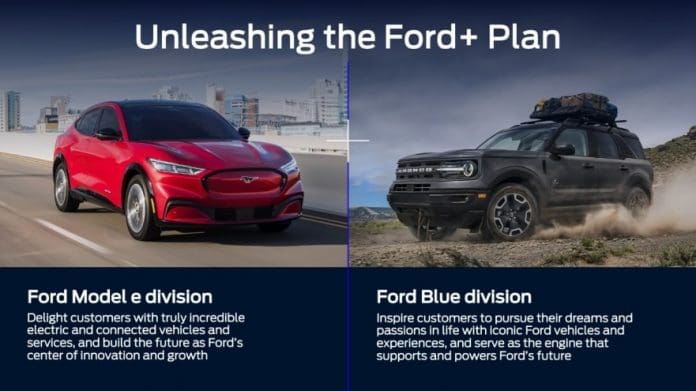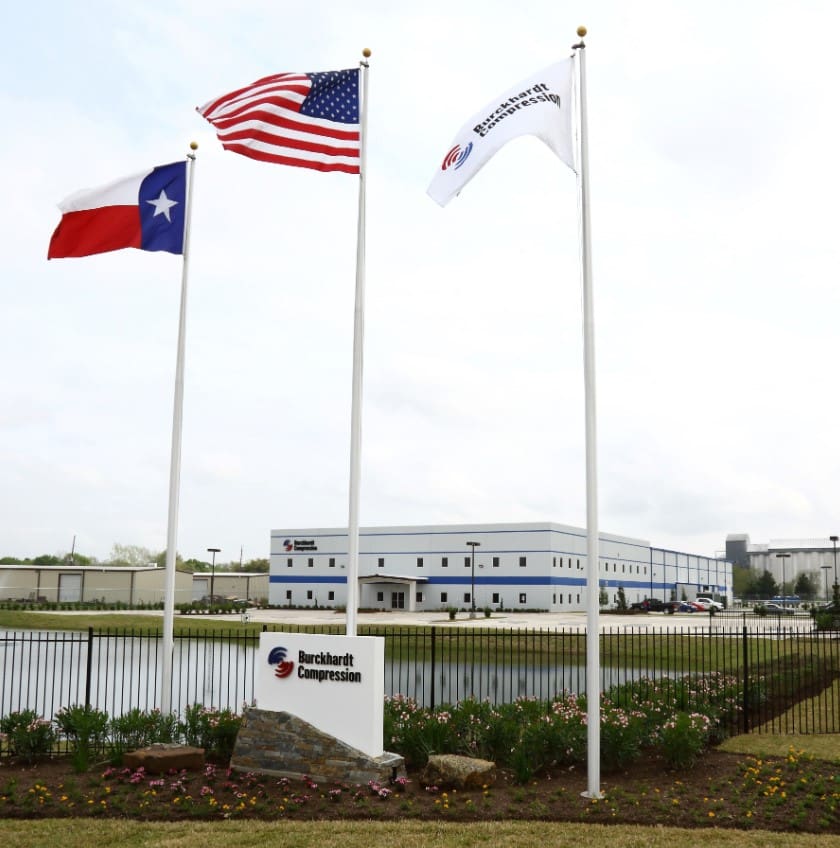The drama is over. On March 2, Ford Motor Company (Ford) officially announced it was splitting its electric vehicle (EV) business from its internal combustion engine (ICE) business. The announcement comes just one month after Ford CEO, Jim Farley, received questions from analysts on the company’s Q4 2021 earnings conference call about whether Ford would consider managing the two businesses separately. At the time, Farley and the rest of Ford management seemed apprehensive toward the idea of splitting the two business units. But clearly, the reservation was just a coy ploy to contain the news.
According to Ford, the company is continuing to transform its global automotive business, accelerating the development and scaling of electric vehicles while leveraging its nameplates to strengthen operating performance and take full advantage of engineering and industrial capabilities. “This isn’t the first time Ford has reimagined the future and taken our own path,” said Ford Executive Chair Bill Ford. “We have an extraordinary opportunity to lead this thrilling new era of connected and electric vehicles, give our customers the very best of Ford, and help make a real difference for the health of the planet.”
Last May, Ford President and CEO Jim Farley introduced the Ford+ plan, calling it the company’s biggest opportunity for growth and value creation since Henry Ford scaled production of the Model T. Ford said that the formation of two distinct, but strategically interdependent, auto businesses — Ford Blue and Ford Model e — together with the new Ford Pro business, will help unleash the full potential of the Ford+ plan, driving growth and value creation and positioning Ford to outperform both legacy automakers and new EV competitors.
“We have made tremendous progress in a short period of time. We have launched a series of hit products globally and demand for our new EVs like F-150 Lightning and Mustang Mach-E is off the charts,” Farley said. “But our ambition with Ford+ is to become a truly great, world-changing company again, and that requires focus. We are going all in, creating separate but complementary businesses that give us startup speed and unbridled innovation in Ford Model e together with Ford Blue’s industrial know-how, volume, and iconic brands like Bronco, that startups can only dream about.”
Rationale Behind The Business Split
Ford decided that different approaches, talents, and, ultimately, organizations are required to unlock Ford’s development and delivery of electric and digitally connected vehicles and services and fully capitalize on its internal combustion vehicles.
The creation of Ford Model e was informed by the success of small, mission-driven Ford teams that developed the Ford GT, Mustang Mach-E SUV, and F-150 Lightning pickup as well as Ford’s dedicated EV division in China.
“Ford Model e will be Ford’s center of innovation and growth, a team of the world’s best software, electrical, and automotive talent turned loose to create truly incredible electric vehicles and digital experiences for new generations of Ford customers,” Farley said.
“Ford Blue’s mission is to deliver a more profitable and vibrant ICE business, strengthen our successful and iconic vehicle families, and earn greater loyalty by delivering incredible service and experiences. It’s about harnessing a century of hardware mastery to help build the future. This team will be hellbent on delivering leading quality, attacking waste in every corner of the business, maximizing cash flow, and optimizing our industrial footprint.”
Ford Model e and Ford Blue will be run as distinct businesses, but also support each other — as well as Ford Pro, which is dedicated to delivering a one-stop shop for commercial and government customers with a range of conventional and electric vehicles and a full suite of software, charging, financing, services, and support on Ford and non-Ford products. Ford Model e and Ford Blue will also support Ford Drive mobility.
Ford Model e
According to Ford, Ford Model e will:
- Attract and retain the best software, engineering, design, and UX talent and perfect new technologies and concepts that can be applied across the Ford enterprise;
- Embrace a clean-sheet approach to designing, launching, and scaling breakthrough, high-volume electric and connected products and services for retail, commercial, and shared mobility;
- Develop the key technologies and capabilities — such as EV platforms, batteries, e-motors, inverters, charging, and recycling — to create ground up, breakthrough electric vehicles; and
- Create the software platforms and fully networked vehicle architectures to support always-on and ever-improving vehicles and experiences.
Ford Model e also will lead on creating an exciting new shopping, buying, and ownership experience for its future electric vehicle customers that includes simple, intuitive e-commerce platforms, transparent pricing, and personalized customer support from Ford ambassadors. Ford Blue will adapt these best practices to enhance the experience of its ICE customers and deliver new levels of customer connectivity and satisfaction.
Ford Blue
According to Ford, Ford Blue will exercise Ford’s deep automotive expertise to:
- Strengthen popular Ford vehicles such as F-Series, Ranger, and Maverick trucks, Bronco and Explorer SUVs, and Mustang, with investments in new models, derivatives, experiences, and services;
- Help customers fulfill their passions and daily lives with tailored brand and vehicle experiences, from off-roading to performance to family activities, especially for those situations when ICE capabilities are required;
- Deliver new, connected, personalized, and always-on experiences for customers powered by Ford Model e’s software and embedded systems;
- Make quality and exceptional service a reason to choose and stay with Ford;
- Root out waste and dramatically reduce product, manufacturing, and quality costs; and
- Support Ford Model e and Ford Pro through proven, global-scale engineering, purchasing, manufacturing, and vehicle test and development capabilities for world-class safety, ride and handling, quiet and comfort, and durability.
Financial Impact
Ford reaffirms guidance for 2022 of US$11.5 billion to US$12.5 billion in company adjusted earnings before interest and taxes (EBIT). The high end of the range equates to a margin of 8% which, if achieved, would be one year earlier than the company’s previous target. With these changes announced today, Ford is raising its longer-term operating and financial targets, including:
- Company adjusted EBIT margin of 10% by 2026, a 270-basis-point increase over 2021 — driven by higher volumes, improvement in the cost of EVs, and a significant decline in ICE structural costs of up to US$3 billion;
- More than 2 million electric vehicles produced annually by 2026, representing about one-third of Ford’s global volume, rising to half by 2030, capturing with EVs the same, or even greater, market shares in vehicle segments where Ford already leads;
- In addition, Ford expects to spend US$5 billion on EVs in 2022, including capital expenditures, expense, and direct investments, a two-fold increase over 2021.
Ford reiterated its commitment to achieve carbon neutrality by 2050, and to use 100% local, renewable electricity in all of its manufacturing operations by 2035.
“This new structure will enhance our capacity to generate industry-leading growth, profitability, and liquidity in this new era of transportation,” said John Lawler, Ford’s chief financial officer. “It will sharpen our effectiveness in allocating capital to both the ICE and EV businesses and the returns we expect from them — by making the most of existing capabilities, adding new skills wherever they’re needed, simplifying processes, and lowering costs. Most importantly, we believe it will deliver growth and significant value for our stakeholders.”
Ford Model e and Ford Blue will work hand-in-glove with other parts of the Ford enterprise. Ford Pro will continue to deliver industry-leading products, services, and support that commercial customers depend on. Served by Ford Model e and Ford Blue, Lincoln will continue to create vehicles. Ford Drive will continue to develop new digitally connected mobility businesses. And Ford Credit will continue to support the customer experience and drive loyalty with a full suite of financial products and services.
Leadership
With the creation of Ford Blue and Ford Model e, Ford is announcing several leadership appointments. Farley will serve as president of Ford Model e, in addition to his role as president and CEO of Ford Motor Company.
Doug Field will lead Ford Model e’s product creation as chief EV and digital systems officer. He will also lead the development of software and embedded systems for all of Ford. Marin Gjaja will be Model e’s chief customer officer, heading the division’s go-to-market, customer experience, and new business initiatives.
“Designing truly incredible electric and software-driven vehicles — with experiences customers can’t even imagine yet — requires a clean-sheet approach,” Field said. “We are creating an organization that benefits from all of Ford’s know-how and capabilities, but that can move with speed and unconstrained ambition to create revolutionary new products.”
Kumar Galhotra will serve as president of Ford Blue.
“Ford Blue’s mission is extremely ambitious,” Galhotra said. “We are going to invest in our incredible F-Series franchise, unleash the full potential of hits like Bronco and Maverick, and launch new vehicles like global Ranger pickup, Ranger Raptor, and Raptor R. We’ll pair these great products with a simple, connected, and convenient customer experience that earns higher loyalty. We are going to be hyper-competitive on costs and make quality a reason to choose Ford. And by doing all that, Ford Blue will be an engine of cash and profitability for the whole company.”
Stuart Rowley and Hau Thai-Tang will take on new global roles to support Ford’s transformation.
Rowley will be chief transformation and quality officer. He will establish quality as a reason to choose a Ford and lead Ford’s drive to improved efficiency, reduced complexity, and a lean, fully competitive cost structure across the enterprise.
Thai-Tang will lead Ford’s industrial platform as chief industrial platform officer. He will lead product development, supply chain, and manufacturing engineering for ICE products and common systems across Ford Blue, Ford Model e, Ford Pro, and Ford Drive.
















